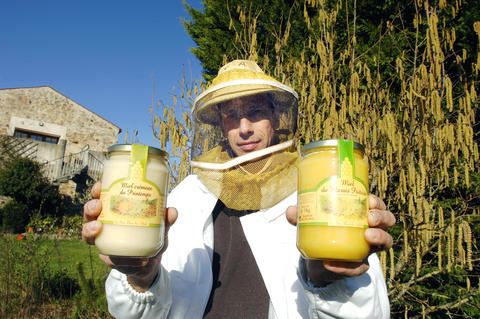Less than a year after France's decimated bee populations showed signs of recovery, beekeepers here are once again in a panic as their income-generating worker drones are disappearing by the tens of millions.
The banning in 2005 of two potent pesticides used on sunflower and corn crops, suspected of killing off the bees, appeared to have stemmed the massive die-offs and reversed nearly a decade of declining honey harvests.
But end-of-winter mortality rates have shot up once again, with up to 60 percent of some hives missing in action.

PHOTO: AFP
"We don't know what is going on, and we are calling everything into question," said beekeeper and honey producer Franck Aletru, whose 2,200 hives are in the Vendee region in western France.
Worries have extended across Europe, where 30 percent of bee species are threatened by an as-yet poorly understood combination of factors, said Bernard Vaissiere of France's national agricultural research institute.
There are more than 1,000 bee species in France, including the domesticated honey-producing variety, and about 20,000 worldwide, he said.

PHOTO: AFP
The apiculture industry in the US - and dozens of agricultural crops, from almonds to apples to avocados, that depend on bees for pollination - has also been devastated, though experts say the reasons, while related, may not be exactly the same.
In France, honey production in the US$150 million sector dropped by half over a nine-year period to 18,000 tonnes in last year, according to agriculture ministry statistics.
Average income for the sector's 75,000 beekeepers has dropped by 65 percent, forcing many to take on second jobs just to make ends meet.
"One of my fellow apiculturists committed suicide, and families have been torn apart," said Aletru.
But last winter, bee populations in France only shed about 10 percent of their numbers - a normal seasonal loss.
Many scientists, and most beekeepers, attributed the first good news in a decade of decline to the banning of Regent and Gaucho, two pesticides thought to enter the hives through the pollen collected by the bees, especially from France's ubiquitous sunflowers.
The manufacturers, German chemical giants BASF and Bayer, have denied that their products are toxic for humans or bees.
"It is difficult to imagine that these insecticides had no impact," said Vaissiere. "They were in the pollen and the nectar - I don't see how the pollinating bees could have failed to ingest them."
But a nest of other factors, experts say, have also contributed to colony collapse disorder: reduced biodiversity stemming from monoculture farming, bacterial parasites such as Varroa destructor and Nosema ceranae and a deadly pathogen called Israeli Acute Paralysis Virus (IAPV).
IAPV has struck the US as well, and is thought to have originated in bees imported from Australia to repopulate hives, and from royal jelly, a honey-derived product manufactured in China.
Another parasite, the varroa mite, may weaken bee's immune systems to the point that they become vulnerable to these diseases, experts say.
The most recent threat to bees is the Asian hornet, Vespa velutina, which probably arrived in southern France in a shipment of pottery sometime in 2004.
The hornet, which preys on honeybees, has already spread through much of southwestern France, and could eventually colonize much of the Mediterranean coastal area, experts say.
"Thirty-five percent of the world's vegetal food resources depend on bees for pollination - we cannot ignore this problem," said Beatrice Robrolle-Marcy, president of the association Bee Planet.

The Democratic Progressive Party (DPP), Chinese Nationalist Party (KMT), and the country’s other political groups dare not offend religious groups, says Chen Lih-ming (陳立民), founder of the Taiwan Anti-Religion Alliance (台灣反宗教者聯盟). “It’s the same in other democracies, of course, but because political struggles in Taiwan are extraordinarily fierce, you’ll see candidates visiting several temples each day ahead of elections. That adds impetus to religion here,” says the retired college lecturer. In Japan’s most recent election, the Liberal Democratic Party lost many votes because of its ties to the Unification Church (“the Moonies”). Chen contrasts the progress made by anti-religion movements in

Taiwan doesn’t have a lot of railways, but its network has plenty of history. The government-owned entity that last year became the Taiwan Railway Corp (TRC) has been operating trains since 1891. During the 1895-1945 period of Japanese rule, the colonial government made huge investments in rail infrastructure. The northern port city of Keelung was connected to Kaohsiung in the south. New lines appeared in Pingtung, Yilan and the Hualien-Taitung region. Railway enthusiasts exploring Taiwan will find plenty to amuse themselves. Taipei will soon gain its second rail-themed museum. Elsewhere there’s a number of endearing branch lines and rolling-stock collections, some

This was not supposed to be an election year. The local media is billing it as the “2025 great recall era” (2025大罷免時代) or the “2025 great recall wave” (2025大罷免潮), with many now just shortening it to “great recall.” As of this writing the number of campaigns that have submitted the requisite one percent of eligible voters signatures in legislative districts is 51 — 35 targeting Chinese Nationalist Party (KMT) caucus lawmakers and 16 targeting Democratic Progressive Party (DPP) lawmakers. The pan-green side has more as they started earlier. Many recall campaigns are billing themselves as “Winter Bluebirds” after the “Bluebird Action”

Last week the State Department made several small changes to its Web information on Taiwan. First, it removed a statement saying that the US “does not support Taiwan independence.” The current statement now reads: “We oppose any unilateral changes to the status quo from either side. We expect cross-strait differences to be resolved by peaceful means, free from coercion, in a manner acceptable to the people on both sides of the Strait.” In 2022 the administration of Joe Biden also removed that verbiage, but after a month of pressure from the People’s Republic of China (PRC), reinstated it. The American